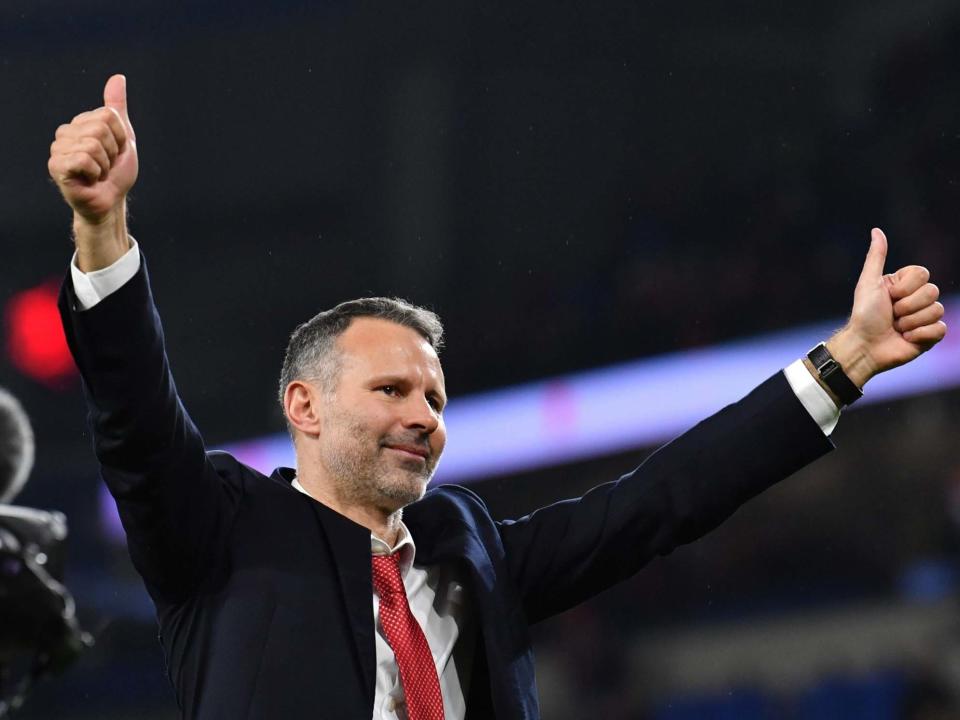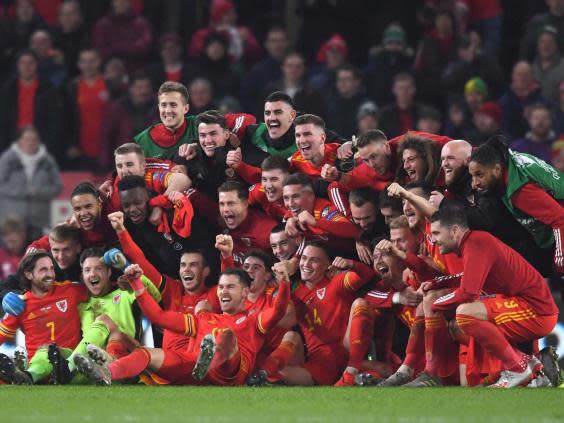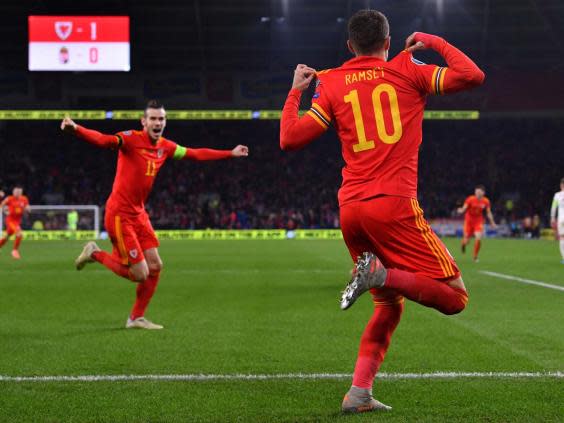Ryan Giggs’ steady evolution of Wales to take them to Euro 2020 moves him closer to elusive adoration

Ryan Giggs had known these November nights in Cardiff before – the nerves, the cloying tension, the desperate yearning of a stadium full of people – but this time was different.
He had been 19 in November 1993, floppy-haired and fleet of foot, when a cruel 2-1 loss to Romania at Cardiff Arms Park deprived Wales of a place at the following year’s World Cup. Ten years later, at a packed, expectant Millennium Stadium, he had been powerless to prevent a 1-0 defeat against Russia that nixed Welsh hopes of a place at Euro 2004. While his 23-year playing career with Manchester United brought only glory, his experiences in the colours of his country brought only gloom.
But at full-time at Cardiff City Stadium on Tuesday night, after Aaron Ramsey’s brace against Hungary earned Wales the last automatic qualifying slot at Euro 2020, Giggs was a picture of contentment, disappearing into a group hug with his coaching staff before striding onto the pitch, a grin stretched across his face, to salute his jubilant players.
“It’s one of the greatest nights of my life, simple as that,” the Wales manager said afterwards. “I had fantastic longevity in my playing career, many highs, and lows as well. But this is different. This feels amazing.”
After the agony of Romania in 1993 and the despair of Russia in 2003, Wales’s 2-0 victory over Hungary made it third time lucky for Giggs in decisive qualifying matches on his home patch. But if it was a different outcome for Giggs, who famously never made it to a major tournament in his 64-cap international playing career, it also felt like a different kind of qualification to the one achieved by his predecessor, Chris Coleman, when Wales last booked their place at the European Championship four years ago.
That success, after 58 years of failed attempts to qualify for a major international tournament, carried the weight of history and was built upon the back of unforgettable moments like the heady 1-0 win over Belgium in June 2015 when the sacred union between players and fans that would sweep the team to the Euro 2016 semi-finals was forged.
Four years on, the level of longing could hardly be the same and Wales additionally went into the game with Hungary in the knowledge that the safety net of a guaranteed play-off spot already lay beneath them. The campaign, too, had been devoid of drama, with Wales scrapping and scratching their way through the group via bitty wins and hard-fought draws.
It was not until the final match that they produced a performance to savour and the dominance that they exhibited from start to finish meant it was a night of only minimal anxiety for the home fans in the 31,762 crowd. Ramsey headed in Gareth Bale’s in-swinging cross from the right in the 15th minute and although Wayne Hennessey had to produce a magnificent double save to deny first Dominik Szoboszlai and then Roland Sallai an equaliser, from the moment Ramsey scored his second goal two minutes into the second half, the result never looked in doubt.

Long regarded coolly by Wales fans after an underwhelming international career during which he once went nine years without appearing in a single friendly, Giggs was a divisive figure from the moment of his appointment in January 2018. Qualification for Euro 2020 will not bring instant adoration, but as he left the pitch for the last time, the emotion visible on his face as he acknowledged the applause from all four sides of the ground, it felt, at the very least, like acceptance.

Although the jury remains out on his tactical acumen, Giggs showed resilience and creativity to turn around a qualifying campaign that began with a return of three points from the first three games. He did so all while steadily evolving his team, with young players such as Daniel James, Harry Wilson, Connor Roberts, Tom Lockyer, Joe Rodon, Chris Mepham, Ethan Ampadu and Joe Morrell all seizing opportunities to shine alongside the established Euro 2016 stalwarts of Hennessey, Ben Davies, Joe Allen, Ramsey and Bale.
The 45-year-old also found a way to achieve results despite both Ramsey and David Brooks missing the bulk of the campaign through injury, shrewdly priming the former for the pivotal visit of Hungary with a 30-minute run-out in last Saturday’s 2-0 win in Azerbaijan.

His masterstroke was the decision, with four matches of the campaign remaining, to bring the towering Kieffer Moore into the team at centre-forward. The 27-year-old former lifeguard has scored two goals in his first five Wales games – one more than he has mustered in 14 Championship matches for Wigan Athletic this season – and his arrival in the team, crucially, has allowed Bale to return to the roaming wide-right role where he is at his most dangerous. Now unbeaten in six matches, Wales look a much more coherent side.
Giggs cracked a smile when he was asked if this qualifying success will help to win over any remaining doubters, replying: “I’m struggling if it doesn’t!”
In his 28 years in the public eye, he has worn many faces, and in more recent times they have not all been entirely flattering: boy wonder, relentless trophy-winner, footballing elder statesman, serial adulterer, wooden pundit. His development into a successful top-level manager could be his most surprising transformation of all.

 Yahoo Sport
Yahoo Sport 





































